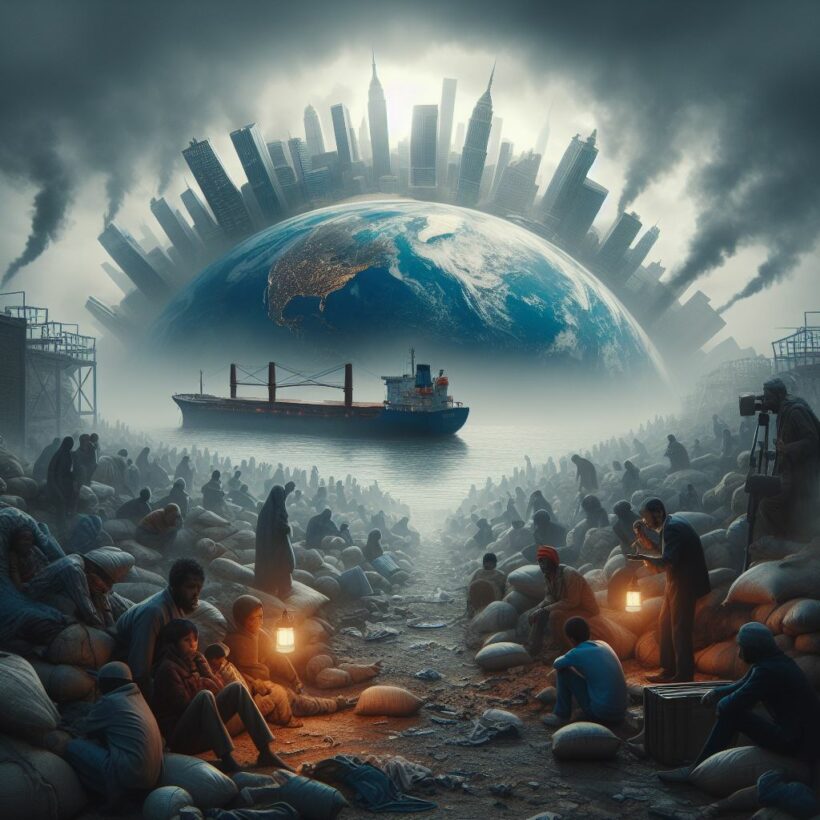International Migrants Day: 18 December 2023 reveals migrants’ tragic reality worldwide.
Desiring a brighter future for oneself and one’s family is not a crime. The obstacles come when individuals who want to legally migrate to areas that provide greater opportunities—such as refugees from war-torn nations—are denied the ability to do so.
By Lal Mia
However, in the hope of a brighter future, desperation may force individuals to set out on unlawful and sometimes perilous maritime voyages when the path to earning an honest livelihood overseas is blocked. As happened to 61 of the 86 migrants who boarded a boat in the Libyan coastal city of Zwara this week, optimism may be deceptive at times and ultimately lead to tragedy.
Instead of the proper outcry, migrant fatalities on the Central Mediterranean route have taken on the features of a common incident, drawing an increasingly subdued reaction internationally. In the first nine months of this year, 2,778 fatalities were reported by the International Organisation for Migration; in the same period the previous year, 1,680 deaths were reported. Improved systems might have prevented many, if not most, of these incidents. However, there isn’t much-coordinated action taken by Western nations to address these sad events at the policy level to stop traffickers from jeopardizing the lives of migrants.
The UN declared December 18 to be International Migrants Day in 2000. The International Convention on the Protection of the Rights of All Migrant Workers and Members of Their Families was approved by the UN Assembly ten years before. But not enough is being done to safeguard immigrants and their families even a generation later.
The lives of migrants do not have to be less valuable than any other, even though fearmongers all too often and effectively paint a different picture. This includes a select group of Western politicians who, in demanding an end to “waves” of migration, all too often pander to voices that are becoming more and more extremist. Western nations, many of which have sizable aging populations, welcome migrants, who contribute to economic development in such nations. 186,000 migrants did manage to reach Southern Europe this year via the sea; many of them were escaping war, starvation, and poverty in Asia, the Middle East, or Africa.
There is virtually always an economic component to the dread of migrants and refugees. However, contrary to what some politicians have started to say, most migrants do not compete for employment held by natives or contribute in any way to “destabilising societies.” Most of the time, they are just utilising chances by taking on work that citizens are unwilling to take on. These days, one may find them in practically every wealthy nation’s retail, hotel, healthcare, and building industries.
There is still much that needs to be done on a global scale to support migrants and refugees, including ensuring their travels are secure and ensuring their complete integration into the communities of the host nations. 184 million individuals, or around 2.5 percent of the world’s population, including 37 million refugees, are non-natives of their home country. “Policymakers should aim to strengthen the match of migrants’ skills with the demand in destination societies while protecting refugees and reducing the need for distressed movements,” according to a World Bank study on migration this year.
A new OECD research on indices of immigrant settlement states that communities and economies benefit from investments in immigrant integration and inclusion policies and that the reverse is also true: a lack of integration has costs. The paper makes recommendations for actions that receiving nations might take, such as acknowledging foreign credentials and combating prejudice that often befalls immigrants.
According to the World Bank study, “These are men and women who make often difficult choices and deserve fair and decent treatment.” Humanity must be at the core of policies regarding migrants and refugees, and there has to be a lot more compassion. Better regulations are required to remove the need for individuals to take on the riskiest alternative possible—setting off on treacherous maritime voyages, where they far too often fail to arrive at their destination.
Lal Mia, an associate professor at the ‘Department of Political Science’ at Mashuddi Razia College in Tangail Bangladesh.






